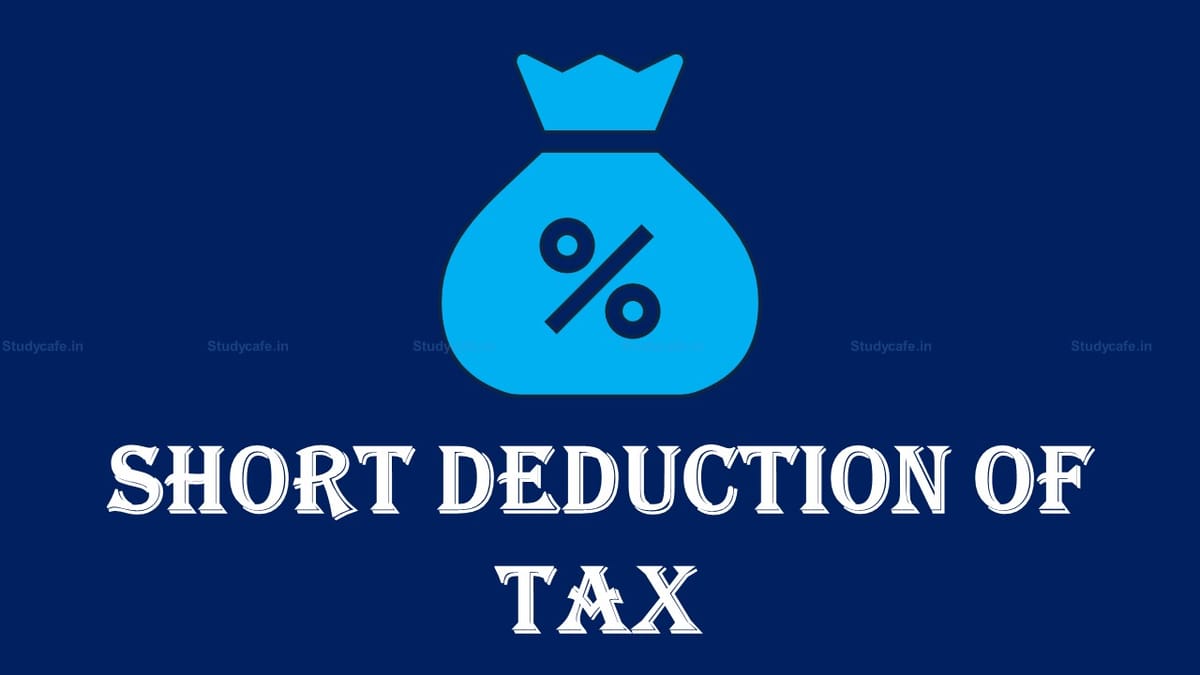Disallowance u/s 40(a)(ia) cannot be triggered in a case of short deduction of TDS: ITAT
CA Pratibha Goyal | Jun 3, 2022 |

Disallowance u/s 40(a)(ia) cannot be triggered in a case of short deduction of TDS: ITAT
The Income Tax Appellate Tribunal (ITAT) in the matter of Shree Sita Edibles Ltd. vs ITO has held that provisions of section 40(a)(ia) of the Act are applicable in a case of non-deduction of tax at source but the same cannot be triggered in a case of short deduction of tax at source.
On a perusal of the records, it transpires that the assessee company during the year under consideration had made a payment of Rs. 25,15,760/- towards warehouse rent.
Observing that the assessee had deducted tax at source on the aforesaid warehouse charges @2% i.e. by treating the same as contractual payments, the A.O called upon it to put forth an explanation as to why TDS was not deducted on the said payments u/s 194I of the Act i.e by treating the same as rental charges. As the explanation of the assesee did not find favour with the A.O, therefore, holding a conviction that the assessee had deducted tax at source on the rental payments at a lower rate i.e. @2% as against the applicable rate of 10% as contemplated in Section 194I of the Act, thus, disallowed the proportionate amount on which TDS was not deducted.
Accordingly, on the basis of his aforesaid observations the A.O disallowed an amount of Rs.2012600/- u/s. 40(a)(ia) of the Act.
7. We have heard the ld. authorized representatives of both the parties, perused the orders of the lower authorities and the material available on record, as well as considered the judicial pronouncements that have been pressed into service by the ld. AR in order to drive home his contentions. After having given a thoughtful consideration to the contentions advanced by the Ld. Authorized Representatives of both the parties, we find that the issue involved in the present appeal lies in a narrow compass, i.e., as to whether or not, a short deduction of tax at source by the assessee would call for triggering the provision of Sec. 40(a)(ia) of the Act for disallowing the amount in question on a proportionate basis as had been done by the A.O in the present case before us. In our considered view, short deduction of tax at source by an assessee by wrongly taking recourse to a wrong provision as provided in Chapter XVII-B of the Act and deducting tax at source at a lower rate cannot form a basis for triggering the provisions of Sec.40(a)(ia) of the Act. Our aforesaid conviction is fortified by the judgment of the Hon’ble High Court in the case of CIT Vs. S.K Tekriwal (2014) 361 ITR 432( Cal.). In its aforesaid judgment, it was observed by the Hon’ble High Court that if there is any shortfall due to any difference of opinion as to the taxability of any item or the nature of payments falling under various TDS provisions, then the assessee can though be declared to be an assessee in default u/s.201 of the Act but no disallowance can be made by invoking provisions of Sec. 40(a)(ia) of the Act. For the sake of clarity the relevant observations of the Hon’ble High Court are culled out as under:
“Here in the present case before us, the assessee has deducted tax u/s. 194C(2) of the Act and not u/s. 1941 of the Act and there is no allegation that this TDS is not deposited with the Government account. We are of the view that the provisions of section 40(a)(ia) of the Act has two limbs one is where, inter alia, assessee has to deduct tax and the second where after deducting tax, inter alia, the-assessee has to pay into Government Account. There is nothing in the said section to treat, inter alia, the assessee as defaulter where there is a shortfall in deduction. With regard to the shortfall, it cannot be assumed that there is a default as the deduction is not as required by or under the Act, but the facts is that this expression, ‘on which tax is deductible at source under Chapter XVII-B and such tax has not been deducted or, after deduction has not been paid on or before the due date specified in sub- section 3 (1) of section 139’. This section 40(a)(ia) of the Act refers only to The duty to deduct tax and pay to government account. If there is any shortfall due to any difference of opinion as to the taxability of any item or the nature of payments falling under various TDS provisions, the assessee can be declared to be y in assessee in default u/s. 201 of the Act and no disallowance can be made by invoking the provisions 4 section 40(a)(ia) of the Act.”
Also, a similar view had been arrived at by a Co-ordinate bench of the Tribunal i.e. ITAT, Mumbai in the case of Assistant Commissioner of Income Tax Vs. UTV Software Communication Ltd. (2021) 62 CCH 0466 ( Mum-Trib). In its aforesaid order, it was observed by the Tribunal that the provisions of section 40(a)(ia) of the Act are though applicable in a case of non-deduction of tax at source but the same cannot be triggered in a case of short deduction of tax at source.
8. On the basis of our aforesaid deliberations, we are unable to persuade ourselves to subscribe to the view taken by the lower authorities and accordingly, set-aside the order of the CIT(Appeals) and vacate the disallowance of Rs.20,12,600/- made by the A.O u/s.40(a)(ia) of the Act.
In case of any Doubt regarding Membership you can mail us at [email protected]
Join Studycafe's WhatsApp Group or Telegram Channel for Latest Updates on Government Job, Sarkari Naukri, Private Jobs, Income Tax, GST, Companies Act, Judgements and CA, CS, ICWA, and MUCH MORE!"